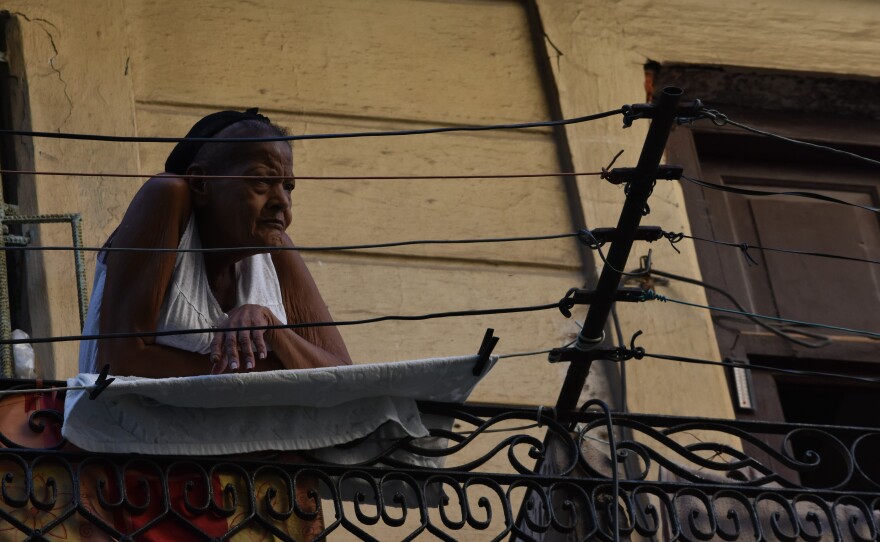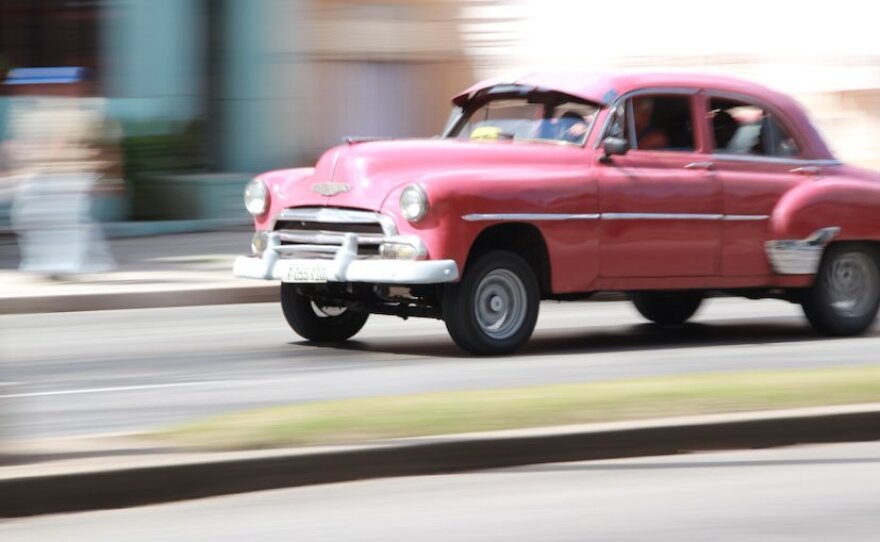A San Antonio lover of arts has begun a project in Cuba which may never bear substantial fruit. But there's a chance that it might, and that has her and many around her incredibly excited.
Angela Martinez runs Slab Cinema, which sets up an inflatable screen at various places around town and shows movies. She said her endeavors have an underlying motive.
“It's not about showing outdoor movies per se. It's about creating something that allows people to come together as a community and to make memories,” Martinez said.
With that as premise, she cites a trip to Cuba seven years ago with her two children as the genesis for her current effort.
“The first time I went was back in 2016. [President Barack] Obama was coming the next week, and the Rolling Stones were on the way,” she said. “That was during the Cuban thaw.”
After the Obama administration lifted U.S. travel restrictions to Cuba, the Rolling Stones shot Havana Moon, a live concert film, at a Cuban stadium.

“They had opened up the access to Cuba, and we went, and we just fell in love. And then I went back in April to do a scouting mission for this project,” Martinez said.
Her interest in the arts goes way back, and given that she also curates exhibits from time to time at Blue Star, her fascination with the arts is clear.
“Art is a uniting force. And when I went to Cuba and started talking to the artists and they just talked about the importance of art in their lives, and I just thought if we could use art as a way to collaborate and engage and build a community between San Antonians and Cubans that that could be very powerful, and something that isn’t really done,” she said.
Martinez has devised a name for this big effort. It’s called The San-Havana Project.
“San Antonio artists are going to Cuba. We're going to engage with the Cuban artists and we're going to have a Cuban art show,” she said. “And then the Cuban artists hopefully will bring back some work and show it here.”
Gary Sweeney is one of those San Antonio artists who is going. This won’t be his first visit.
“My wife and I were there in 2012 and 2015, and we're excited about this being our third trip,” he said.
Before the Obama changes, Americans didn’t get to just visit because they want to. Sweeney said trips to Cuba had to contain a stated objective.
“There are 12 categories where they allow people to visit from the United States officially. And one of them is culture, and they're really big on the arts there,” he said.

The San-Havana Project clearly falls within a couple of possible categories. Sweeney said preparing to go to Cuba reminds one of the peculiar, strained relations between Cuba and the US.
“When we went down there, I just thought that the island was completely isolated. And then we've discovered that it's only isolated to Americans.”
Sweeney said that’s a shame because there’s a natural affinity between the cultures.
“They really like Americans down there. But they don't like what our government has been doing to them,” he said.
Sweeney said the reality of Cuba making vacationing there a complicated process wasn’t a random decision, but the result of some dicey history between Cuba and the US.
“There was the Bay of Pigs invasion…we tried to assassinate Fidel Castro. So when you wonder why they're clamped down…they don't want to be saved by us, but they'd like us to be friends again. This is the people I'm talking about,” Sweeney said.
Martinez said her two previous visits—including talking with many artists there—had her concluding that art holds a higher station there.
“I do believe the Cuban culture might value arts more than we do. When I go there, art is everywhere. The artists are gratified. I believe that they're making a living with their art.”
Martinez said while researching the project, she came across another reason to make the art interchange.
“I wanted to go to Cuba and I was looking for a legal reason to do so, and as I was filling out the paperwork, I saw it said, ‘If you make a documentary, that's like a journalistic endeavor,’” she said.
Turns out Anthony S. Garcia of Jojo Dancer Photography wanted to help.
He is one of seven artists going along and it’s him who’s shooting footage and stills for the project. “I'm going to do as much video as I can and bring it back to do some kind of mini documentary,” Garcia said.

As a photographer, Garcia is an artist, and he’s also going to exhibit some of his photos for the Havana showing. “Anywhere from five to seven prints, maybe a few more,” he said. “I don't know exactly what the number will be. I got a week to figure that one out.”
Martinez said that week has now wound down by a couple of days, and the trip is imminent. “We're leaving Monday, we'll be back Friday,” Martinez said.
There’s not a big financial incentive: Cuba won’t at this time let San Antonians sell their art prints in Cuba, nor will they allow Cuban artists to sell in a San Antonio exhibit. Martinez’s objectives are higher-minded than just commerce.
“I just thought if we could use art as a way to collaborate and engage and build a community between San Antonians and Cubans, that that could be something very special and very powerful and something that isn't really done,” Martinez said. “I’m just using it as a way to build community and to try to do bring some good in the world where I can.”














